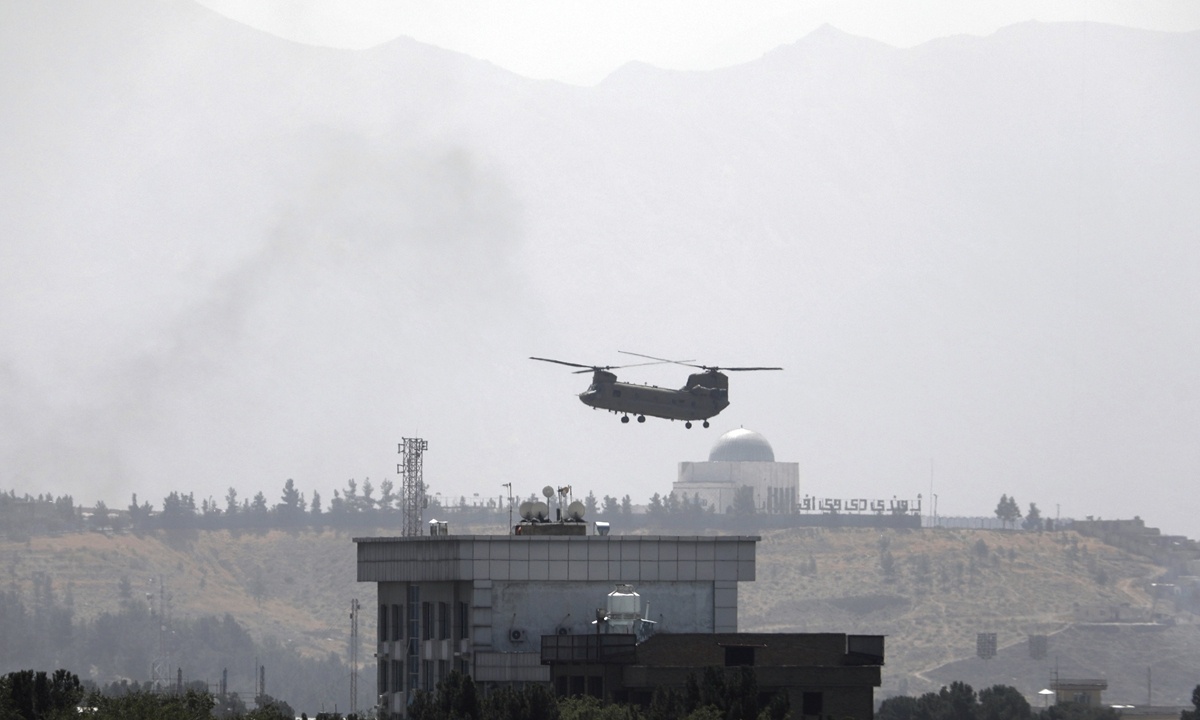
A US Chinook helicopter flies over the U.S. Embassy in Kabul, Afghanistan on Sunday. Helicopters are landing at the US embassy there as diplomatic vehicles leave the compound as the Taliban advance on the Afghan capital. (Photo: VCG)
While the US' bungled and embarrassing withdrawal from Afghanistan is still shocking the world, the American media has already started to worry about possible cooperation between the Afghan Taliban and China, especially when it comes to Afghanistan's rare-earth resources.
Rare-earth metals in Afghanistan were estimated to be worth anywhere between $1 trillion and $3 trillion in 2020. China may "align itself with Taliban and try to exploit Afghanistan's rare-earth metals," US media outlet CNBC reported on Tuesday, citing an investment analyst's so-called "warning."
The US has spent 20 years on its "anti-terror war" in Afghanistan, investing a huge amount of resources to support the government. It's not hard to imagine that there are huge economic considerations behind this. Over the past two decades, US firms have enjoyed privileges in exploiting rare resources in Afghanistan. The US troops' withdrawal and the drastic change in Afghanistan's situation is undoubtedly a heavy blow to US economic interests in Afghanistan and the wider region. With many US businesses leaving due to losing their protection, the US may instead choose to obstruct future cooperation between Afghanistan and other countries. We cannot rule out the possibility that the US could launch its notorious sanction measures again to protect its economic interests in the region after US troops' withdrawal.
However, the US is in no position to meddle with any potential cooperation between China and Afghanistan, including on rare earths. The so-called "warnings" in the CNBC report show that American firms doing business in Afghanistan are dissatisfied with Washington's hasty evacuation and therefore the loss of their "privileges," and it also reveals the US' fear of possible advancement for China with regard to the rare-earth sector. After all, China has a much better track record in successfully cooperating with developing countries around the world.
Besides, the rare-earth sector is one in which China has a strong advantage and it is a sector that plays a critical role in the development of strategic emerging industries.
Cooperation between China and Afghanistan will be determined by the two countries based on each side's demands and advantages no matter who comes to power in Afghanistan.
In fact, as early as in 2009, China and Afghanistan inked a memorandum of understanding on mining industry cooperation. Current projects include a copper mine in Aynak which launched in the same year. Later in 2011, an oilfield project in Afghanistan invested by China National Petroleum Corporation was officially signed, according to the website of Embassy of China in Afghanistan.
An early statement addressing the cooper mine project showed that with a budget of $4.2 billion, the project, upon completion, was expected to see an annual output value of $1.2 billion. The project was estimated to create about 10,000 local jobs.
Meanwhile, the cooperation between China and Afghanistan extends beyond the mining sector. As of the end of 2020, China's accumulated non-financial direct investment in Afghanistan totaled $630 million, mainly focused on mining, communications and road construction. Total bilateral trade in 2020 was $550 million. In addition, China has helped build hospitals, water conservancy projects and provide training for various professionals across the country.
As the largest neighbor of Afghanistan, China is a vigorous partner for the war-battered country to get its economy back on track, given China's experience and capability in related areas, such as agriculture and industrial infrastructure.
By sharp contrast, US-led predatory resource exploitation in the country has not delivered tangible benefit to ordinary Afghan people or benefits to the nation's economic growth. Its GDP ranked 112 across the world in 2020, with employment concentrated in low-productivity agriculture.
There's no denying that challenges still remain in promoting new projects, as stable political and social environment is a fundamental cornerstone for future progress, while how long it will take for the country to realize stability remains to be observed.


